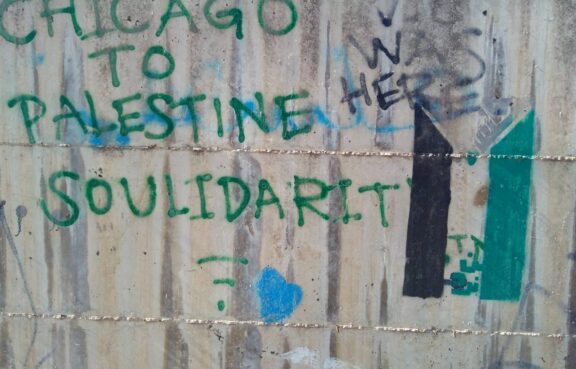The following is a humble presentation I shared as a recording to the event A Faculty Teach-In: Palestine, Cease Fire Now! Settler Colonialism, Palestinian Liberation, and Solidarity, held on November 7, 2023 at the Arab American Cultural Center at University of Illinois at Chicago.
“We are all wasted. Barely breathing. And yet functioning like warrior women queens.”
That was a note I sent to my friends a week ago, a month ago, a day ago, this morning, I cannot remember—in the ceaseless violence of an ongoing Nakba, now openly referred to as a genocide—time functions or dysfunctions in its own way. As a historian, I should be better at playing with temporality, but it feels more like I am being played with these days. As a Palestinian, I should be better at playing with remembering and memory—it is, after all, what I write about, what I teach about—and what we live.
Our very peoplehood is being bombed. The goal is to destroy everything. The goal is to eliminate all of what and who we are. The arsenal of weapons towards achieving this goal is mind-breaking, beyond any human sensibilities. Even the most infuriating pontificators of violence have said this is a genocide and Gaza has been violently transformed into a graveyard of children. They are working to destroy us. They will not.
I teach history. In Palestine, I actually teach the present. It is a unique challenge. I noticed this—to be relevant in my teaching here, my work is different than elsewhere. Not better, not worse, just distinctly different. The idea of an open classroom is a unique pedagogical tool that the best of professors utilize. For me, it is not even really a choice. I teach about Palestine to Palestinians living in Palestine. But the open classroom here means that we are all students. Great professors—like the ones around you—remind themselves that they learn as they teach. I am one step ahead, not because I am brilliant, but because this is Palestine and we are Palestinians, we have always been one step ahead.
I am also from Chicago—born and raised. So when Nadine Naber asked me if I could send along a recording for this event along, her ask was kind because we are all so wasted, but my response was quick. It is in Chicago, of course I will. So, I want to simply say this, my friends, we are in this together. I am recording this note on a day I teach a course that is basically the history of colonialism. Today, our classes have one less student because she was brutally arrested this morning by the vicious Israeli military machine. Birzeit University students have always been warriors. Today, like every Tuesday for a month now, teaching is not quite the goal, our goal is to come together and gather. We need to take care of each other, listen to each other, grieve together and nurture our rage together.
We are full of grief, we are living through a nightmare that is, frankly, beyond my ability to understand. I come from a long line of warrior women, like every Palestinian. My grandmother survived 1948 and survived becoming a refugee. My mother survived 1967 and made a decision somewhere along the line to raise a daughter who could learn how to refuse everything and understand that grief and sadness has to feed rage. And so I am angry. I am furious. I am broken hearted and every break feeds me and us. Our rage is this sadness and grief on fire. Our rage is righteous—our cause is just—and we will be free—we will teach—we are teaching the world how getting free is a journey we take together.
I am recording this note from my barenda (balcony), the place of stories in my head. I have shared these stories over the past month in short notes sent to my fellow warrior women queens. I love these warriors who happen to be spread out geographically throughout the world and who have also managed to nurture the space for our stories in these deeply dark days. They read me and listen to us. These stories remain in a state-of-waiting, like dough in need of further ingredients and the heat of an oven to bake into full form. One day we will share the stories this month has produced with everyone. I will do so in celebration of us.
Every child who has been murdered before they could even know the magic and honor it is to be Palestinian shall be mourned. We will remember every breath stolen. But we will remember in grief and in joy. There will be joy for us—and our joy will be multiplied because our journey is one we shared with all of the oppressed of the world.
We are all wasted. Barely breathing. And yet, we are warrior women queens. I share with you and live with you our collective love and rage.
Cover image by the author.


